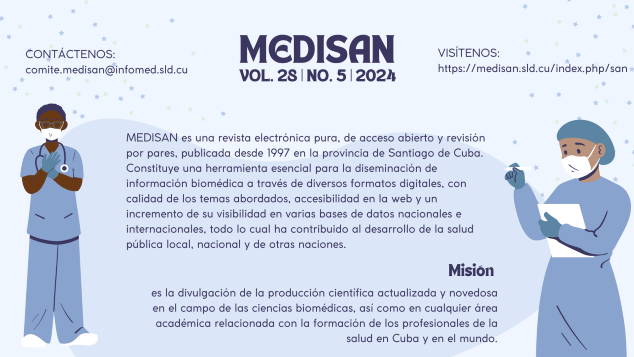Effectiveness of hypnotherapy in patients with conversion disorders
Keywords:
therapeutics, hypnosis, conversion disorders, hysteria.Abstract
Introduction: In the XIX century, Jean-Martin Charcot laid the clinical foundations to study the hysteria, where hypnosis had a preponderant role. It can be stated that works carried out from a psychoanalytical perspective consolidated the use of the term hysteria in contemporary clinic.
Objective: To evaluate the effectiveness of hypnotherapy in patients with conversion disorder.
Methods: An experimental study was carried out on 36 patients, from both sexes, with conversion disorders, treated in the Therapeutic Hypnosis Clinic from the University of Medical Sciences and the Southern Children Hospital in Santiago de Cuba, from July to September, 2017. To such an effect, two groups were formed with 18 members each one (selected at random): control group (received drug treatment and individual psychotherapy) and study group (therapy with hypnosis). Seven therapeutic sessions were designed to compare the symptomatic clinical course as a response to the recommended treatment.
Results: There was a decrease of the symptomatic pattern in both groups, because there was a high percentage of patients recovered from the conversion disorder, with 88.8% in the study group and 55.5% in control group.
Conclusions: Hypnotherapy was effective in patients with conversion disorders.Downloads
References
2. Pérez Fernández F, López Muñoz F. Una aproximación al fenómeno de la “plaga vampírica” de la Europa Oriental Ilustrada desde una perspectiva psicomédica: De las epidemias a la histeria colectiva. Revista de Historia de la Psicología. 2022[citado 04/06/2024];43(3):34-42. Disponible en: https://dialnet.unirioja.es/descarga/articulo/8594380.pdf
3. Cardona Quitian, HE. El tratamiento de la histeria a finales del siglo XIX y el agujero de la ciencia médica. Desde el Jardín de Freud: Revista de Psicoanálisis. 2012[citado 04/06/2024];(12):293-310.Disponible en: https://dialnet.unirioja.es/descarga/articulo/4635406.pdfhttps://dialnet.unirioja.es/descarga/articulo/4635406.pdf
4. Lambert Delgado A, Cobián Mena AE. Hipnosis en trastornos psicosomáticos. Una aproximación a su valor terapéutico. Santiago de Chile: Centro de Hipnosis Clínica; 2021.
5. Hernández Vicente N, Anadón Ruiz L, Herrera Alegre R, Dalda Navarro V. Intervención de la enfermera de salud mental en el trastorno conversivo. RSI. 2024[citado 04/06/2024];5(2). Disponible en: https://revistasanitariadeinvestigacion.com/intervencion-de-la-enfermera-de-salud-mental-en-el-trastorno-conversivo/
6. Pulvet MA. Vigencia de la histeria en la época actual. En: XV Congreso Internacional de Investigación y Práctica Profesional en Psicología. XXX Jornadas de Investigación. XIX Encuentro de Investigadores en Psicología del MERCOSUR. V Encuentro de Investigación de Terapia Ocupacional V Encuentro de Musicoterapia. Buenos Aires: Universidad de Buenos Aires, Facultad de Psicología; 2023[citado 04/06/2024]. Disponible en: https://www.aacademica.org/000-009/453.pdf
7. Hernández Sampieri R, Fernández Collado C, Baptista Lucio MP. Metodologı́a de la investigación. 6 ed. México, D.F: Mcgraw-Hill/Interamericana; 2014[citado 04/06/2024]. Disponible en: https://www.esup.edu.pe/wp-content/uploads/2020/12/2.%20Hernandez,%20Fernandez%20y%20Baptista-Metodolog%C3%ADa%20Investigacion%20Cientifica%206ta%20ed.pdf
8. Sánchez Boris IM. Los trastornos psicosomáticos en el niño y el adolescente. Medisan (Santiago de Cuba). 2020[citado 04/06/2024];24(5). Disponible en: http://scielo.sld.cu/pdf/san/v24n5/1029-3019-san-24-05-943.pdf
9. Zuniga Carrasco IR, Miliar de Jesús R. Trastorno conversivo epidémico. Rev Hosp Jua Mex. 2023[citado 18/06/2024];90(2):74-9. Disponible en: https://www.researchgate.net/publication/372116391_Trastorno_conversivo_epidemico
10. Maymó Gallurt L. Regulación emocional y temperamento en el trastorno conversivo en adolescentes: estudio de casos y controles [Tesis]. Les Illes Balears: Universitat de les Illes Balears; 2021.
11. Ciotti Abreu R, Suellen Costa L, Fernandes Barbosa VA, Sathler G, Dias Barbosa MH. Trastorno Conversivo: Un desafio diagnóstico. Revista Ibero-Americana de Humanidades, Ciências e Educação. 2023[citado 18/06/2024];9(8). Disponible en: https://periodicorease.pro.br/rease/article/view/10937/4657
12. Goñi Navarro A, Ruiz Lázaro P, Calvo Sárnago A. Más allá de la parálisis psicógena, un trastorno mental grave. Rev Psiquiatr Infanto-Juv. 2021[citado 05/07/2024];38(2):66-71. Disponible en: https://aepnya.eu/index.php/revistaaepnya/article/view/363/354
13. Dorado Dols MC. Tratamientos psicológicos para el abordaje del trastorno neurológico funcional: una revisión sistemática [Tesis]. Castellón: Universitat Jaume I. 2021[citado 05/07/2024]. p. 26. Disponible en: https://repositori.uji.es/xmlui/bitstream/handle/10234/195469/TFM_2021_Dorado%20Dols_Maria%20Carmen.pdf?sequence=1&isAllowed=y
14. Escribano Paredes JB, Natera Villalba E, Porta Etessam J, Vela L, García Ruiz Espiga P, Alonso Cánovas A, et al. ¿Qué piensan los estudiantes de Medicina sobre los trastornos neurológicos funcionales? Rev Neurol. 2023[citado 07/06/2024];76(8). Disponible en: https://www.ncbi.nlm.nih.gov/pmc/articles/PMC10478140/
15. Amoruso L. Una perspectiva neurocientífica sobre la histeria. Rev. colomb. psicol. 2010[citado 04/06/2024];19(1). Disponible en: https://repositorio.unal.edu.co/bitstream/handle/unal/47503/12269-49676-1-PB.pdf?sequence=2&isAllowed=y
16. Mutarelli EG, Bartorelli B. Transtorno neurológico funcional (transtorno conversivo). In: Studart Neto A, Soares Neto HR, Calderaro M, Conforto AB, Barbosa ER, et al. Neurología. Río de Janeiro: Atheneu; 2021.p. 1441-50.
17. Arancibia M. M, Angulo P. C, Sepúlveda A. E, Papuzinski A. C. Trastornos somatomorfos y conversivos en otorrinolaringología pediátrica: revisión de la literatura. Rev. Otorrinolaringol. Cir. Cabeza Cuello. 2021[citado 04/06/2024];81(1):113-21. Disponible en: https://www.scielo.cl/pdf/orl/v81n1/0718-4816-orl-81-01-0113.pdf
Published
How to Cite
Issue
Section
License
All the articles can be downloaded or read for free. The journal does not charge any amount of money to the authors for the reception, edition or the publication of the articles, making the whole process completely free. Medisan has no embargo period and it is published under the license of Creative Commons, International Non Commercial Recognition 4.0, which authorizes the copy, reproduction and the total or partial distribution of the articles in any format or platform, with the conditions of citing the source of information and not to be used for profitable purposes.





